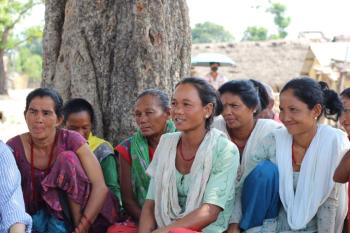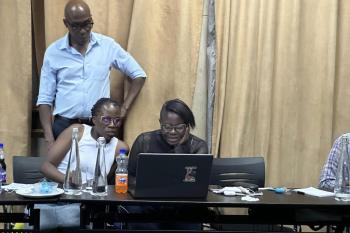Webinar: Bridging the Gap on Land Governance and Tenure along the Urban-Rural Continuum
Date: Thursday, 26th of July 2018 (via Webex, see connection details below) Time: 15:00h CEST / 16:00h Nairobi Time / 9:00 AM EDT Duration: 1 Hour RSVP/ Contact Please confirm your participation to Romy Sato, Secretariat of the Global Donor Platform for Rural Development – romy.sato@donorplatform.org
Developing countries are facing irreversible urbanization trends with significant impact on the way land is accessed, used and managed.
The increased flow of knowledge, economic activities and information between urban and rural areas has blurred the lines of what is traditionally urban land and what is rural land. Strict land use distinctions and classifications are becoming more and more difficult and irrelevant, and this requires re-thinking and transformation in the way land is regulated, valued, transacted (land markets) and put to fruitful use. The weakness of both policy and planning systems related to land management and their tremendous transformation has particularly visible effects in peri-urban areas. Increasing land conflicts are evident at the intersection between rural and urban land with consequences both socially and economically due to a lack of security of tenure and integrated spatial planning mechanisms. Migration, increased food insecurity, obstacles to land acquisition for public infrastructure and development and the optimum use of public lands are some of the key challenges encountered. Unfortunately, little knowledge and expertise has been produced so far to guide decision makers and local authorities responsible for land management in this context. Within an increasingly urbanizing world, there is renewed interest in ensuring that complementary and mutually reinforcing development across rural, peri-urban and urban areas is an integral part of emerging global regional frameworks, such as the Agenda 2030, the New Urban Agenda and the African Land Policy declaration. It is time to raise awareness and to develop comprehensive land policies and frameworks to deal with land along the urban-rural continuum, if the world does not want to witness the sprawl of unplanned, inefficient and unsustainable urban agglomerations that negatively affect rural development rather than catalysing and accelerating it.About the Webinar:
The webinar is part of the activities of the Global Donor Working Group on Land. The main objective of the Webinar is to review critical land governance and tenure security challenges arising in peri-urban areas during the transformation from rural to urban, to guide policy and land administration interventions. During the session, it is expected that key land actors:- Share experiences and develop a common understanding of critical issues around land governance and tenure security along the urban-rural continuum.
- Explore opportunities for joint (social, economic, political) interventions to address some of the key aspects characterizing the urban-rural linkages (e.g. value chain and flow of good, migration, investment, infrastructure development, etc.)
- Identify critical entry points to guide programming for donors and decisions makers.
Agenda and Discussants :
The 1 hour interactive session will encourage discussions based on few key presentations by experts who will set the scene by giving their perspectives and help identifying the key aspects of the topic.- Moderator : Harold Liversage - IFAD and Chair of the GDWGL
- Alain Durand-Lasserve - Centre National de le Recherche Scientifique (CNRS), presenting Land challenges in expanding sub-Saharan African cities in a context of rapid urbanization
- Geoffrey Payne - Urban Development and Housing Consultant, presenting the economic and social impacts on land use transformation from rural to urban.
- Harris Selod - Senior Economist - World Bank
- Q&A Session
- Oumar Sylla - Head of the Land and GLTN Unit, UN Habitat
Biography of Presenters
Alain Durand-Lasserve is a Senior Research Fellow at the Centre National de le Recherche Scientifique (CNRS), France. He is currently Associate Researcher in the Laboratory Les Afriques dans le Monde (LAM), a joint research centre of the University of Bordeaux, the CNRS and the National Foundation for Political Sciences, France. His personal research topics are: methodological frameworks to analysing land and tenure situations and dynamics; land markets and land delivery systems in cities in developing countries; urban land management impacts of land and tenure on urban development dynamics and spatial expansion of cities; tenure security policies for the urban poor; tenure regularisation and land titling in urban and peri-urban areas. During the past two decades, he has been mainly involved in research and consultancy in sub-Saharan African countries on land and tenure issues and policies, for various bilateral development agencies, for the UN and for the World Bank. Geoffrey Payne (MSc, Dip.Arch. MRTPI, FRSA) is an urban development and housing consultant with more than four decades of international experience. In addition to extensive academic experience, he has undertaken numerous research and consultancy assignments for international agencies including UN-Habitat, the World Bank and UK government. He has contributed to many international conferences and published widely. Recent publications include:- ‘Policy and Politics in urban land market management: lessons from experience’ in Bredenoord, Jan; van Lindert, Paul and Smets, Peer (editors).
- ‘Affordable Housing in the Urban Global South’ Earthscan from Routledge, 2014.
- ‘Land Issues in Rwanda’s Post Conflict Law Reform’ chapter 2 in Home, Robert (editor)
- ‘Local Case Studies in African Land Law’ Pretoria University Law Press, 2011.
- ‘Social and Economic Impacts of Land Titling Programs in Urban and Peri-Urban Areas: A Short Review of the Literature’ (with Durand-Lasserve, Alain and Rakodi, Carole in Lall, Somik, Freire, Mila, Yuen, Belinda, Rajack, Robin and Helluin, Jean-Jacques (edtors)
- ‘Urban Land Markets: Improving Land Management for Successful Urbanization’ Springer, New York, 2009.
Connecting to Webex Please click here for detailed instructions on how to connect via Webex. Choose one of the two options to join: Via computer
- Go to WebEx(link is external)
- If requested, enter your name (e.g. "Romy Sato, Platform secretariat") and email address.
- If required, enter the meeting password: 1234
- Click "Join".

